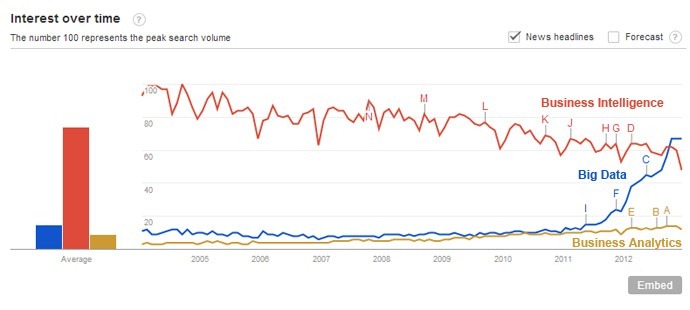The term “business intelligence” was first coined by IBM researcher Hans Luhn in 1958, and then used in its modern sense in 1989 by then-Gartner analyst Howard Dresner.
Earlier this year, Gartner joined other analyst firms such as IDC and started using “business analytics” as an umbrella term for solutions for turning data into value :
Business analytics is comprised of solutions used to build analysis models and simulations to create scenarios, understand realities and predict future states. Business analytics includes data mining, predictive analytics, applied analytics and statistics, and is delivered as an application suitable for a business user. These analytics solutions often come with prebuilt industry content that is targeted at an industry business process (for example, claims, underwriting or a specific regulatory requirement).
There’s still lots of disagreement about the differences between the terms “business intelligence” vs “business analytics” (read the comments), but it now increasingly looks like the battle of the semantics has been lost to a newcomer: “big data”.
Google Trends lets us take a look at the dramatic rise of the term in searches, while “business intelligence” continues its slow, steady decline, and “business analytics”, while still growing, doesn’t look like it will ever catch up…
The term “big data” is used just as nebulously as its rivals. The reality is that new terms are created because of new technology — in this case ‘big data” was first used (this time around) to describe the new opportunities afforded by Hadoop, Map Reduce, etc.
But, of course, everybody in the market knows that they are supposed to talk about the business benefits not the features: “the hole, not the drill bit!” — but the business benefits are, of course, the same as they’ve always been: better decisions, insight, lower costs, etc. So everybody, even those not using Hadoop etc, started using it in conjunction with whatever was new in the industry (technologies like in-memory, mobile, cloud, visualization, predictive; data sources such as sensors, social, etc… )
This meant that the definition of “big data” quickly became another industry squabbling match that has generated liters of ink (and nostalgia: The Google Books Ngram Viewer seems to show the term was first used in the 1930s and that the term was clearly used in roughly the same sense as today even in 1969: “”Datamec has made some headway outside the field of big data processors”)
What will the future hold? Will we all end up using “big data” as the new umbrella term? Will something else come along to take its place?
Time will tell, but in the meantime, I’ll stick to my position in the BI vs analytics post: “real people” shouldn’t care very much. Let the analysts and marketers bicker — instead, you should concentrate on pragmatically solving the business needs you face with the best technology available, whatever it’s called…


Comments
6 responses to “Is Big Data The New Term for Business Intelligence?”
[…] possible using previous technology, and would have been called BI or analytics in the past have suddenly been rebaptized in a fairly blatant attempt to jump on the big data […]
[…] Data instead of BI: The trend continues of the term “big data” taking over from “business intelligence”, as in this post, Fighting Pirates with Big Data, via Dave […]
[…] possible using previous technology, and would have been called BI or analytics in the past have suddenly been rebaptized in a fairly blatant attempt to jump on the big data […]
[…] my tongue-in-cheek definition, and it’s worth noting that big data is quickly becoming the default term for what we used to call analytics or business […]
[…] data” than some of its predecessors (DSS or Decision Support Solutions, anyone?), its use is rising in popularity very quickly, and folks like McKinsey and the Harvard Business Review have used it to describe pretty much any […]
[…] Web 2.0 with SAP Are You Ready For SAP's Big Data Processing Framework?Could Ebenezer Scrooge Be On YOUR Board?The Peril of Analytics (Cartoon)Is Big Data The New Term for Business Intelligence? […]